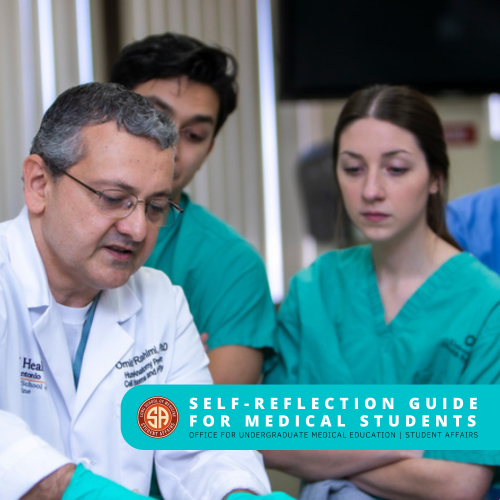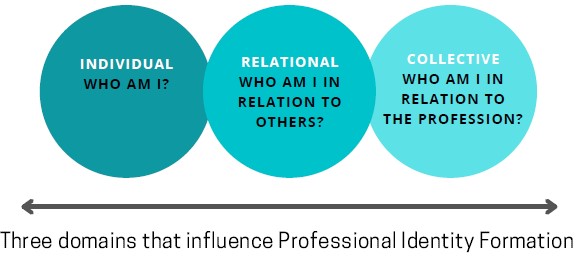

Medical professional identity formation (PIF) is a journey of personal development and social construction. It is the process of enculturation into the actions, interactions, values, and norms of the medical profession (Cruess et al., 2010).
Reflection is an effective and powerful tool that helps learners use their experiences to construct meaning, developing their professional identities. A reflective practice can be incredibly valuable because it incorporates both cognitive thinking and affective feeling. “Guided reflection on experience may be formative and can support the active, constructive, developmental process of professional identity formation” (Wald, 2015 as cited in Wald, et al., 2018). To promote reflective capacity, the Student Affairs team has put together a Self-Reflection Guide for Medical Students as a way to help medical students expose and understand their values and vulnerabilities. To request a print copy of this guide, please contact medstudentaffairs@uthscsa.edu.
A person's identity is a combination of who they are - personality, ethnicity, values, etc. and how how all these parts fit into the world. Throughout training, a medical student's physician identity formation is influenced and constructed through language, experiences, symbolic events, and interactions with others. Learners begin to internalize the characteristics, values, and norms of the medical profession, when they learn to think and talk like a doctor.

Professionalism in medical education and practice remains one of the cornerstones of health care and plays a vital role in PIF. Endorsed by enumerable professional groups, including the Accreditation Council on Graduate Medical Education (ACGME), the ABIM’s Medical Professionalism in the New Millennium: A Physician Charter delineates fundamental principles and 10 commitments that guide physicians in both training and practice.
ACGME Definition of Professionalism – As manifested through a commitment to carrying out professional responsibilities, adherence to ethical principles, and sensitivity to a diverse patient population.
Using the ACGME Definition of Professionalism, the University of Texas Health Science Center at San Antonio Long School of Medicine challenges students to aspire to the highest standards of professionalism throughout their transformative journey of being a competent, ethical physician.
Involvement in student leadership plays a big role in professional identity formation. Review leadership opportunities* available through the Long School of Medicine. *Opportunities subject to change.
Codes & Charters
Resources
Articles
- Professionalism in Medicine: Definitions and Considerations for Teaching
- Professionalism and Medicine
- Disciplinary Action by Medical Boards and Prior Behavior in Medical School
- A Strategy for the Detection and Evaluation of Unprofessional Behavior in Medical Students
- The Developing Physician – Becoming a Professional
- Remediation of the Deficiencies of Physicians Across the Continuum From Medical School to Practice: A Thematic Review of the Literature
- Self-Reflection Guide for Medical Students